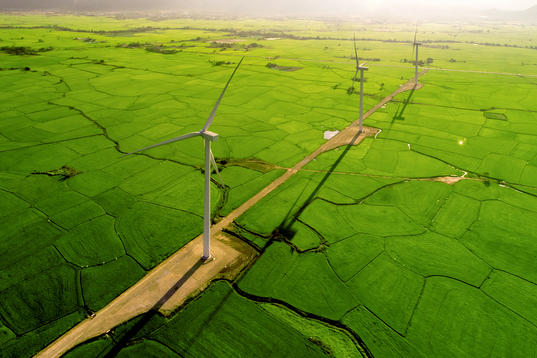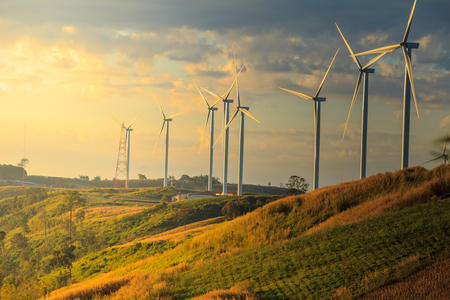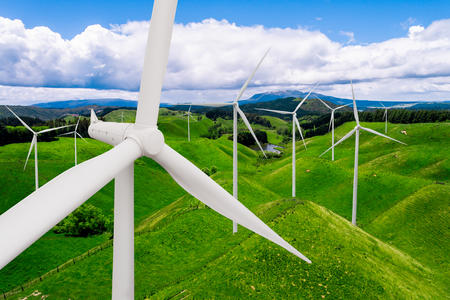At the beginning of 2021, John Kerry, the US climate envoy called COP26 the world’s ‘last best chance’ to move on climate change. President Obama's former Secretary of State negotiated the landmark Paris climate agreement in 2015. Making it a reality needed the world to come to Glasgow to agree on sets of rules that turn the ambition into action.
Despite what some commentators have said, the summit was a milestone. Before the end of 2022, countries are requested to come back with new 2030 emissions reductions pledges and the phase out of coal made it into the negotiation text for the first time. Countries were urged to scale up clean power and accelerate “efforts towards” the phase-down of “unabated” coal and “inefficient” fossil fuel subsidies. While some of the wording may be infuriating, as was obvious for Alok Sharma, it showed the pressure points to use when countries come back to the table in Egypt this November.
At Climate Group, we don’t just wait expecting countries to do the job for us. Our mission is to drive climate action. Fast. Last year, RE100 members hit a combined demand for renewable electricity of 334 TWh – more than the 326TWh used to power the whole of the UK. This could save enough CO2 emissions equivalent to the burning of more than 118 million tons of coal per year. RE100 companies helped achieve one of the COP Climate Champions targets of 20% of major power consuming businesses by revenue committing to going fully renewable.
These have huge potential to scale up. For instance, COP26 saw us working with the US State Department on CEDI, the Clean Energy Demand Initiative which will amplify RE100 progress within diplomatic networks around the globe and this is only one of the many policy initiatives in 2022.
Policy progress
Strong 2030 NDC targets are key to reaching net-zero, but this year countries will also need to focus on pre-2030 actions and set robust pathways, ideally embedded in law. Many countries saw Paris as a long-term ‘net-zero’ promise game, but how can you do that job without a strategy?
RE100 engages across sectors and value chains to address barriers to climate action. We drive dialogue between businesses, governments, and other stakeholders to support policies for corporate sourcing of renewables. Our RE100 Global Policy Asks are making it into governments’ handbooks on how to make the clean energy transition in key geographies such as Europe, South Korea, Japan, Australia, the US, and India. 2021 saw us launch our new South African hub, RAiSE (Renewables Ambition in South African Energy).
Last year we launched a campaign in South Korea driven by evidence from leading local research institutes. Their research had shown that South Korea’s export-oriented economy is sensitive to increasingly volatile energy markets and practices around ESG. Sharing this evidence and our previous policy wins, like including RE100 policies in COVID-19 recovery packages, resulted in the acceleration of electricity reforms in the country.
This year, we’re starting a project in which we will celebrate countries making bold climate and energy commitments, including ambitious energy targets in 2022. In doing so, we will use research and data to increase pressure on slower governments to make renewable energy commitments and adopt supportive policies to achieve 2030 targets. We will expand our focus to more G20 countries so watch that space.
Do numbers drive climate action?
Accountability materialised as a clear priority for 2022, following COP. For now, the mechanisms for checking if countries’ commitments match the 1.5°C target are not linked well enough into the UNFCCC reporting system. The sectoral commitments, and the non-state actor commitments, such as business ones, are also under question.
The climate movement needs the power of numbers to deliver change. Data drives those policy discussions that don’t make it to the streets. Should we make both simpler and more accessible? Yes. Could that make detailed energy governance less arduous? Probably not. That’s why RE100 provides policy makers and the global NGO community with evidence that our companies are serious about achieving 100% RE globally and helping governments raise renewables ambition.
In fact, this week, we’re publishing our 2021 Annual Disclosure report, which celebrates membership progress and gives you some powerful insights into corporate renewables sourcing globally. For now, all eyes are turning toward Egypt in November and we want to see stronger actions and commitments.
Happy New Year!



